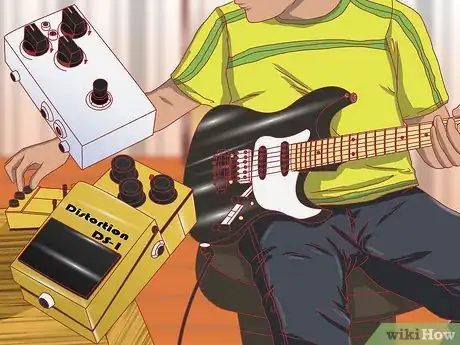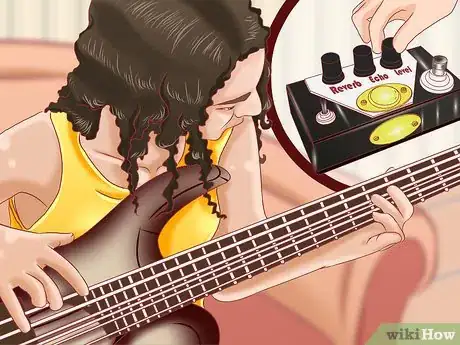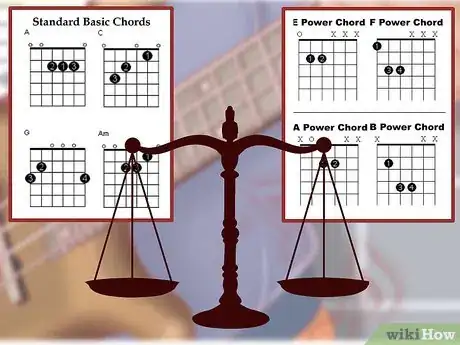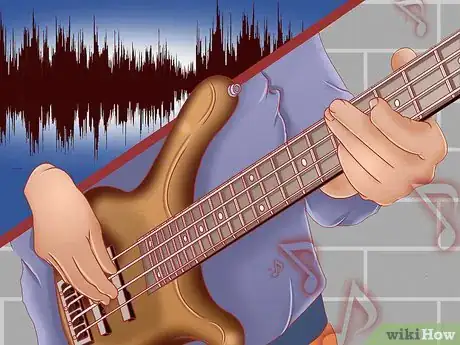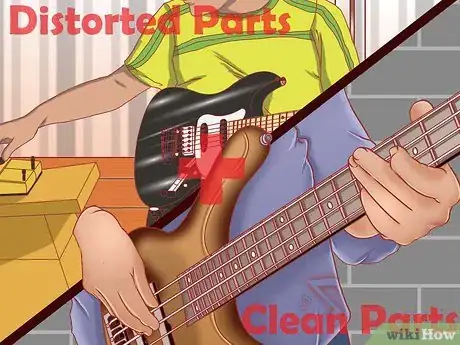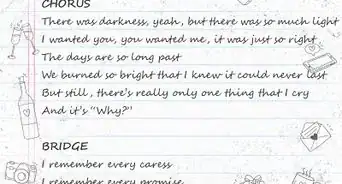wikiHow is a “wiki,” similar to Wikipedia, which means that many of our articles are co-written by multiple authors. To create this article, 47 people, some anonymous, worked to edit and improve it over time.
This article has been viewed 141,595 times.
Learn more...
This is a short article on how to write a grunge song. Grunge is a sub genre of heavy metal that emerged from Seattle in the late 1980's, and though it is descended from punk-metal bands in 1980s Seattle, the genre lost virtually all its punk influence in the early 90s and became an alternative metal genre. Grunge songs feature sludgy guitar riffs with plenty of effects pedals, melancholy lyrics, and an ambient, reverberated sound, along with plenty of unusual techniques such as alternating time signatures, diminished and unusual chords, dissonance, and very, very powerful vocals. Although major/minor chords are mainly used in grunge, it is entirely possible (and better) to just use power-chords if you're a beginner starting out.
Steps
-
1Listen to grunge. You can't write a grunge song if you don't know how grunge sounds! Listen to the bands named above; learn to play their songs; look up what type of guitars, amps and pedals they use.
- If you can, it is really important you listen to not just those bands, but the bands that inspired them. Bands like Black Sabbath, the Doors, and Hüsker Dü gave them the dark, gloomy sound, while blues guitarists can help you with the lead guitar playing.
-
2Use distortion and/or overdrive. Distortion is essential for harder rock genres, and especially metal. An important part of grunge is alternating between distorted and clean.
- If you don't have a big budget, some amps have an overdrive button installed. If you can afford it, you can't go wrong with a good quality pedal.
- Make sure you know how and when to use distortion to good effect in a song. Be careful not to use too much gain - amateur guitarists will always assume gain = heaviness, but this simply isn't true.
Advertisement -
3Have and know how to use a chorus, echo and/or reverb pedal. A very important part of the grunge sound found in the likes of Nirvana, Pearl Jam, Alice in Chains and Soundgarden is an ambient reverb sound on a clean guitar.
-
4Know how to make use of non-standard tunings in your songs. Eb is the recommended tuning. Of course, standard tuning can still produce heaviness if you're talented enough.
- Many grunge bands use unconventional tunings to good effect. "Mind Riot" by Soundgarden (a very experimental band) has every string tuned to an E.
-
5Think of how you want your band/music to sound. How hard you want it to be, what kind of riff you want, the meaning of the lyrics.
-
6Use a balanced amount of power chords. Power chords are an important basis of rock music in general. Avoid making riffs/songs based entirely on three or four power chords and try to be experimental; this isn't punk rock!
-
7Try to make the guitar sound unusual in tone. Guitarist Jerry Cantrell used talk box and wah-pedals, and Kim Thayil used a similar setup as well as unconventional techniques for his.
-
8Use both clean parts and distorted riffs in your song. The famous clean-verse-distorted-chorus structure is an important part of grunge and is found in many famous songs, such as Alice in Chains' "Rooster", Soundgarden's "Black Hole Sun" and Nirvana's "Heart Shaped Box".
-
9Have a powerful vocal melody. The biggest grunge vocalists - Layne Staley, Chris Cornell, Eddie Vedder, Scott Weiland - are all considered among the most talented vocalists in rock music history. Your melody should force the vocalist into their full potential.
-
10Now that you're done with music, move on to lyrics. Keep them poetic, but not meaningless. Grunge lyrics are often odd and confusing out of context, but once they are analysed they are incredibly meaningful. Grunge lyrics are almost always personal, with emphasis on writing about how you feel (or alternative, storytelling that is equally emotional) and less on political or fantastical ideas.
-
11To start a band, keep the following in mind:
- The guitarist must be talented and have melody in his/her playing. A background in blues and country helps. Shredding is great in thrash, not so much in grunge.
- The band should have a competent bassist. Although underrated, the bassist is incredibly important to the rhythm and essential to a deep, heavy sound. The bassist should be audible in the mix, and basslines should be distinct from the guitar riffs.
- Your drummer has to be skilled. Grunge drumbeats are very metal-esque. He/she should not only be able to play fast, but know progressive skills like switching time signatures and tempo changes. Grunge is experimental, and the beat is important to keeping the music together.
- Above all, the vocalist must be well-trained. He/she should have a big range (a strong baritone is recommended) and plenty of stamina.
Community Q&A
-
QuestionIf Grunge is not a subgenre of punk, then why is every grunge band inspired by mostly punk bands?
 Community AnswerMost kinds of music overlaps, and the genre of music doesn't matter as to where a band gets its influences. For example, my band is punk pop and one of our best influences is The Who, which is classic rock.
Community AnswerMost kinds of music overlaps, and the genre of music doesn't matter as to where a band gets its influences. For example, my band is punk pop and one of our best influences is The Who, which is classic rock. -
QuestionThere was no mention of Nirvana in the article. Should I not look to them for inspiration?
 Community AnswerNo, Nirvana should definitely have been mentioned, they are more legendary than some of the bands mentioned. Nirvana is great for inspiration.
Community AnswerNo, Nirvana should definitely have been mentioned, they are more legendary than some of the bands mentioned. Nirvana is great for inspiration.
Warnings
- As per above, grunge is not simple and easy - people who never liked grunge have tried lambasting it as simple, dirty and mindless, and the idea has stuck. If you are a beginner, challenging yourself is always great, but do keep in mind that grunge is not meant to be easy at all.⧼thumbs_response⧽
- Despite common misconception, grunge is not a type of punk. Grunge is a metal subgenre which takes influence from blues and country, with a bit of psychedelic. If you can play no more than three chords and won't play without distortion, grunge is not for you.⧼thumbs_response⧽
- Grunge is very similar to its derivative genre, sludge metal, which is a far more extreme and punk-like variant of grunge. Try not to confuse the two!⧼thumbs_response⧽
- If Nirvana are the only grunge band you know, you'll have no hope of starting a grunge band. Listen to Alice in Chains, Soundgarden and STP, as well as the underachievers like Gruntruck or Tad that never made it as big, before you even think of making grunge music.
- Due to grunge's origins in Seattle, plenty of different rock bands were labelled "grunge" because of their origins. Make sure you listen to a diverse range of these bands so you can spot what is grunge and what isn't.
⧼thumbs_response⧽
Things You'll Need
- A microphone, guitar, bass guitar and a drum kit
- Effects pedals and amplifiers
- Preferably, recording equipment and software

